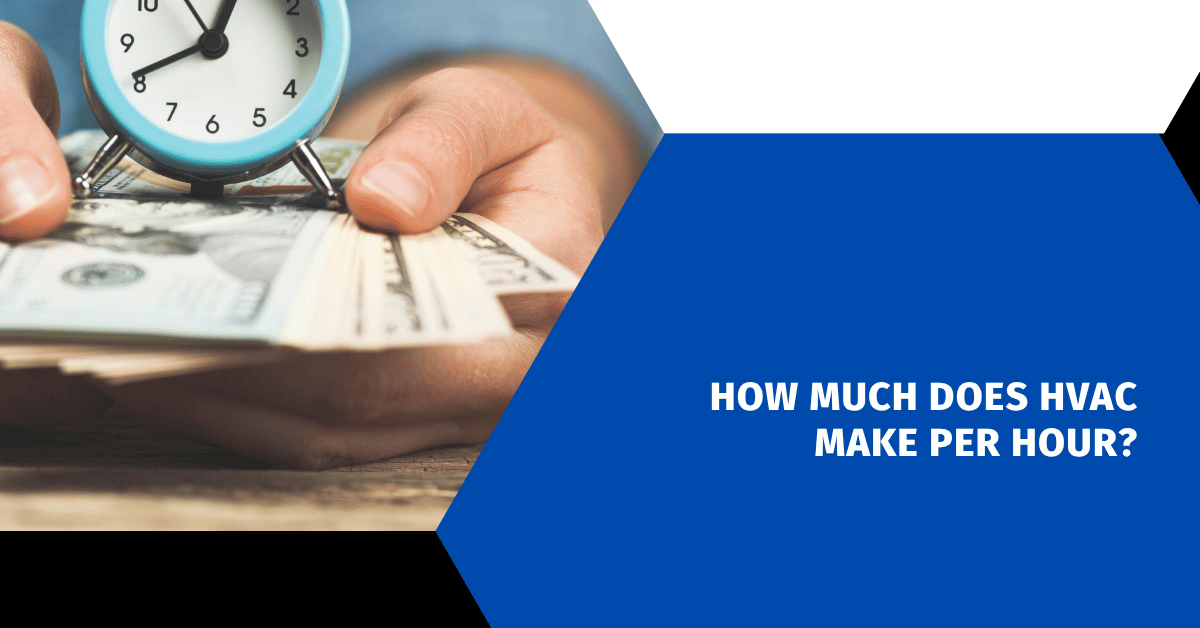Affiliate Disclosure
HVAC Guide Guys is a participant in the Amazon Services LLC Associates Program, an affiliate advertising program designed to provide a means for sites to earn advertising fees by advertising and linking to Amazon.
How Much Does HVAC Make Per Hour? Ever thought about what you could earn in the HVAC industry? This field is not just a job. It offers a good hvac technician hourly rate that might surprise you.

Recent labor statistics show HVAC technicians make about $48,730 a year. That’s around $23.43 an hour. But, how much you make can change a lot.
Your earnings depend on your experience, where you work, your specialty, and the type of job. Whether you’re working on big commercial systems or small home units, there are many ways to grow your income in HVAC.
Key Takeaways
- Median HVAC technician hourly rate is $23.43
- Annual median salary reaches $48,730
- Earnings vary by experience and specialization
- Multiple factors influence HVAC technician pay
- Skilled trade with competitive compensation
Table of Contents
Understanding HVAC Technician Pay Rates
Thinking about becoming an HVAC technician? Knowing how much you can earn is key. The HVAC industry offers great pay for skilled workers in the U.S.
How much you make as an HVAC tech depends on a few things. Your salary can change based on your experience, where you work, and your special skills.
National Average Hourly Wages
HVAC techs get paid well for their skills. Hourly rates range from $22 to $32, based on your experience and what you specialize in.
- Entry-level technicians: $22 per hour
- Mid-career professionals: $25-$27 per hour
- Experienced technicians: $30-$32 per hour
Factors Affecting Pay Rates
Several things can affect how much you earn in HVAC:
- Where you work greatly affects your salary
- Having special certifications can raise your value
- The size of your company can impact your pay
- Whether you work on homes or businesses
Salary Ranges by Experience Level
As you get more experience, your pay can really go up. More skilled and experienced technicians earn more.
Staying up-to-date with training and skills can greatly increase your future earnings in HVAC.
Explore Our HVAC Shop
Looking for top-rated HVAC tools, parts, and accessories? Visit our shop and find the perfect solution for your needs.
Visit the ShopTop Paying States for HVAC Technicians
Some states are better for HVAC professionals when it comes to earnings. Your income can change a lot based on where you work in the U.S.
Alaska is at the top with great pay for HVAC techs. The state’s tough weather and unique location mean a big need for skilled workers. HVAC techs in Alaska make more than the national average.
Here are the top states for HVAC techs:
- Alaska – Median annual wage of $68,310
- Hawaii – High compensation due to tropical climate demands
- Washington – Strong technology and construction sectors
- Massachusetts – Dense urban environments with complex HVAC needs
- Connecticut – Robust infrastructure and commercial markets
Here’s a table showing median annual wages for top HVAC states:
| State | Median Annual Wage | Cost of Living Factor |
|---|---|---|
| Alaska | $68,310 | High |
| Hawaii | $64,500 | Very High |
| Washington | $61,790 | Moderate |
| Massachusetts | $60,550 | High |
| Connecticut | $59,890 | High |
Your earnings depend on more than just where you work. Experience, specialization, and skills also play a big role. While these states pay more, your success in HVAC also depends on local markets and your skills.
Explore Our HVAC Shop
Looking for top-rated HVAC tools, parts, and accessories? Visit our shop and find the perfect solution for your needs.
Visit the ShopHow Much Does HVAC Make Per Hour in Different Regions
Understanding how much HVAC workers make in different areas can help you choose the right career path. The United States has various regions with different pay rates for HVAC technicians. These rates change based on local economy, demand, and living costs.
Your earnings as an HVAC technician can vary a lot depending on where you work. Let’s look at how salaries differ across major US regions:
Northeast: High-Demand Market
The Northeast is known for its high HVAC technician salaries. Places like Massachusetts offer good pay, thanks to the area’s high living costs and strong industry.
- Massachusetts average annual salary: $73,300
- New York competitive wage ranges
- Connecticut’s robust HVAC job market
Southern States: Emerging Opportunities
In the South, HVAC pay rates are different. While they might be lower than in the Northeast, the growing population and construction sectors offer good chances.
- Florida average annual earnings: $46,940
- Texas growing HVAC job market
- Georgia’s emerging industrial needs
Western States: Diverse Compensation Landscape
Western states, like California, have their own pay structures for HVAC workers. The tech hubs and booming construction industries lead to competitive wages.
- California median annual wage: $56,690
- Washington’s tech-driven market
- Arizona’s expanding infrastructure
Your location is key to your earnings as an HVAC technician. Do your research on local markets and opportunities to boost your career.
Entry-Level vs Experienced HVAC Pay
Your pay as an HVAC technician can really grow with experience. At first, you might earn less, but with the right moves, you can make more money.
Starting out, you’ll likely earn between $18 and $25 an hour. This is because you’re new and don’t have much experience yet. But, as you get better, you’ll become more valuable in the market.
- Entry-level (0-1 years): $22.47 per hour
- Mid-career (5-9 years): $27.65 per hour
- Experienced (10+ years): $32.83 per hour
To earn more, keep learning. Get special certifications, take advanced courses, and learn new skills. This will help you move up the pay scale quicker.
| Experience Level | Hourly Rate Range | Annual Salary |
|---|---|---|
| Apprentice | $18 – $22 | $37,440 – $45,760 |
| Journeyman | $25 – $30 | $52,000 – $62,400 |
| Master Technician | $32 – $42 | $66,560 – $87,360 |
Invest in your growth to increase your earnings. The more skills you have, the more you can earn in this changing field.
Commercial vs Residential HVAC Salaries
The HVAC industry offers many job opportunities. There are big differences between working on commercial and residential projects. Knowing these differences can help you choose the right path and earn more.
Commercial HVAC jobs usually pay more because they are more complex. They need special skills and advanced knowledge. This is different from the usual residential work.
Commercial Project Rates
Technicians working on commercial projects earn more. This is because of:
- More complex system designs
- Larger infrastructure requirements
- Advanced technical expertise
- Extended project timelines
Residential Service Earnings
Residential HVAC work has its own benefits. Even though it pays less, it offers:
- More consistent scheduling
- Opportunities for repeat customer service
- Potential for building a loyal client base
- Shorter project durations
Specialized Installation Pay
Some HVAC installation niches can really increase your earnings. Specialized technicians who work on advanced systems like industrial refrigeration or high-efficiency commercial units get paid more.
“Expertise in specialized HVAC installations can dramatically increase your market value and income.” – HVAC Industry Expert
Your career path depends on your skills, certifications, and where you work in the HVAC industry.
Explore Our HVAC Shop
Looking for top-rated HVAC tools, parts, and accessories? Visit our shop and find the perfect solution for your needs.
Visit the ShopCareer Advancement and Salary Growth

Starting a career in HVAC can lead to great opportunities for making more money. Skilled technicians can move up from entry-level jobs. This opens the door to higher earnings through smart career choices.
There are several ways to grow in the HVAC field:
- Supervisory and management roles
- Specialized technical certifications
- Starting an independent HVAC business
- Technical training and advanced education
Getting into management can really boost your income. Supervisors and senior technicians often earn more than newbies. Your technical skills become very valuable for leadership roles.
| Career Stage | Average Annual Income | Growth Potencial |
|---|---|---|
| Entry-Level Technician | $35,000 – $45,000 | Initial Learning Phase |
| Senior Technician | $55,000 – $75,000 | 25-40% Increase |
| HVAC Business Owner | $80,000 – $150,000+ | Unlimited Potencial |
Starting your own HVAC business can lead to even higher earnings. This path needs a big investment but can pay off big. Successful contractors build strong client relationships, offer a variety of services, and use smart marketing.
Strategic skills development and continuous learning are key to unlocking higher earnings in the HVAC industry.
Seasonal Variations in HVAC Earnings
HVAC worker pay changes a lot throughout the year. Technicians see big changes in their income based on the season. Knowing these patterns can help you make more money and plan your finances better.
The HVAC industry has its own income cycles. Smart technicians can use these cycles to their advantage. By knowing when to work hard, you can make more money.
Peak Season Income Opportunities
Summer and winter are the best times for HVAC workers. During these months, many people need cooling and heating. This means more work and higher pay.
- Summer peak season can increase hourly rates by 20-30%
- Winter emergency calls often command premium rates
- Residential and commercial projects surge during extreme temperatures
Off-Season Compensation Strategies
To keep income steady when it’s slow, you need a plan. HVAC technicians who offer different services can keep working and earning.
- Offer preventative maintenance contracts
- Complete system upgrades and installations
- Provide training and certification services
Overtime and Emergency Rates
Emergency repairs and overtime can really boost your pay. Technicians who are ready to work hard can earn more than usual.
Pro tip: Build relationships with commercial clients who require 24/7 emergency services to maximize your earnings during slow times.
Benefits and Additional Compensation

When looking at hvac professional compensation, it’s important to see the whole picture. Hourly rates are just the start. The total package can greatly improve your financial situation.
Top HVAC employers know that keeping skilled technicians is key. They offer more than just a salary. Your compensation might include:
- Health insurance coverage
- Retirement savings plans
- Paid vacation and sick leave
- Performance-based bonuses
- Tool and equipment allowances
Skilled HVAC professionals can expect extra financial benefits. Many companies offer profit-sharing. This means you can earn more based on the company’s success.
“The right benefits package can add thousands of dollars in value to your annual compensation” – HVAC Industry Compensation Report
Some benefits might include:
- Comprehensive medical, dental, and vision insurance
- 401(k) matching contributions
- Continuing education reimbursement
- Professional certification support
Your total compensation is more than just your hourly wage. When you’re offered a job, look at the whole package. This will help you understand your true earning power in the HVAC industry.
Explore Our HVAC Shop
Looking for top-rated HVAC tools, parts, and accessories? Visit our shop and find the perfect solution for your needs.
Visit the ShopState Certification Impact on Wages
State certifications can greatly increase your HVAC installer salary. They also boost your professional standing in the field. Getting the right credentials shows your dedication to excellence. This can directly affect your hvac service rates.
Professional certifications bring many benefits for HVAC technicians aiming to earn more. The most valuable ones include:
- EPA 608 Certification (mandatory for handling refrigerants)
- NATE (North American Technician Excellence) Certification
- State-specific HVAC licensing credentials
- Specialized technical training certificates
Investing in these certifications can raise your hourly rate by 10-25%. Employers value certified technicians for their advanced skills and commitment. The more specialized your certification, the higher your earnings in the competitive HVAC market.
Your career growth relies on ongoing learning. State certifications prove your expertise and open doors to better job opportunities. Advanced certifications can help you earn more and stand out from non-certified competitors.
“Certifications are your passport to higher earning in the HVAC industry.” – Professional HVAC Association
Look into your state’s specific certification needs. Each state has its own licensing standards. These can greatly affect your professional credentials and earnings as an HVAC technician.
Conclusion
The HVAC industry is full of chances for a stable and fulfilling career. When you look into how much HVAC workers make per hour, you’ll see that pay varies. This depends on experience, where you work, and your area of expertise.
The job outlook is good, with a 5% growth from 2020 to 2030. This means there are plenty of opportunities for skilled technicians.
Your earnings as an HVAC contractor can grow if you keep learning and improving your skills. Places with harsh weather, complex buildings, and green tech will pay more. Specializing in commercial work or green tech can also boost your income.
As the U.S. focuses on energy efficiency and green buildings, HVAC workers will become even more important. New technologies and certifications can make you stand out. Keeping up with trends and improving your skills will help you earn more and advance in your career.
With careful planning and a love for technical work, you can have a rewarding HVAC career. The industry’s future looks bright, with a steady need for experts in heating, cooling, and ventilation.

